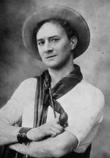Actor, writer, dramatist, journalist, monologist.
The father of Sir Michael Redgrave, grandfather to Lynn, Vanessa, Corin, and Major-General Sir Roy Redgrave, and great-grandfather to Jemma Redgrave, Roy Redgrave made his theatrical debut in England in the late 1880s or early 1890s, and over the next decade established his reputation as a leading man in a number of dramatic companies. After spending some two years in South Africa he took up an offer from J. C. Williamson to appear in a company headed by American actress Tittell Brine. He made his Australian debut in September 1904, and went on to tour the country (as well as new Zealand) for two years playing in a variety of productions, including Romeo and Juliet, Sunday, and Merely Mary Ann. Redgrave returned to England in early 1906, finding engagements in London and on the provincial circuits, while also writing a number of plays and dramatic sketches.
Redgrave returned to Australian in 1909 under contract to William Anderson. He made his debut with the entrepreneur's Famous Dramatic Organisation at King's Theatre on 1 May, originating the lead role of Dave Goulburn in the premiere production of Albert Edmunds' bush drama The Man From Outback . It was to be the first of several roles he created over the years; the others included Jack Macquarie in White Australia (1909), Jack Dunstan in The Bushwoman (1909), and Jack Melton in My Mate (1911). He also later developed the lead character for one of John Cosgrove's plays, the naval drama Jutland (1919).
Redgrave's Australian stage career saw him appear in many dozens of plays and sketches, some of which he wrote himself. The sketches, which included 'Waterloo,' 'A Near Thing,' 'The Rat in the Corner' 'Billy From the Back of Beyond,' and 'The Tragedy On Our Selection' were presented on vaudeville bills for such organisations as Fullers Theatres and Harry Clay. He also wrote the comic interlude, 'Quarantine,' which was staged on the Fullers' circuit by Sydney James and his Pierrot Pie Company (ca. 1919) and 'The Pommy Bride,' a popular musical comedietta presented by the Mademoiselle Mimi Diggers (1921-1922).
Among the plays Redgrave wrote for the stage while in Australia were: By Wireless Telegraph (1910) and The Sorrows of Satan (1911) and The Black Streak (reportedly staged in the USA). He also claims to have had another drama, The Man of Mystery, staged (no details have yet been located), as well as having adapted new versions of The Christian and David Garrick. Among the plays he reportedly wrote in England between 1906 and 1909 and which were staged in that country were The King of Death, Luck and Pluck and The Better Half (ctd. Adelaide Mail 9 September 1916, p7).
In addition to his long association with William Anderson Redgrave also played numerous engagements for J. C. Williamsons between 1914 and 1921, playing opposite such actresses as Muriel Starr while also appearing in such productions as the Peter Pan, (playing the role of Starkey). His Australian acting career included, too, lead roles in close on a dozen motion pictures, the most notable being The Christian (1911, and for which he was also engaged as director of acting), The Hayseeds (1917, as Dad Hayseed) and Robbery Under Arms (1920).
Aside from his acting career, Redgrave contributed his views and stories to a number of newspapers and magazines in England, Australia, and South Africa. In late 1921, while appearing in Sydney production of The Maid of the Mountains, his health deteriorated markedly. His decision to refuse medical treatment ultimately led to his death the following year. Despite his considerable influence and career in the country, he died alone and penniless.
 6218152600816226298.jpg
6218152600816226298.jpg